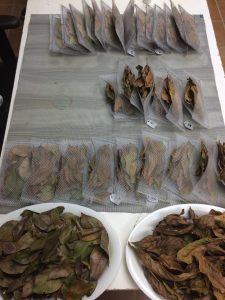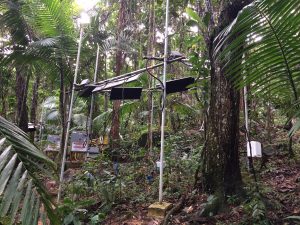3 January 2019
Climate warming experiment finds unexpected results
Posted by llester
Climate models predict plant decomposition in the tropics will increase in a warmer world, but a new study shows the opposite
By Emily Pontecorvo

Dried leaf samples are bagged and numbered before being returned to study sites in Puerto Rico’s El Yunque National Forest. Heaters warmed experimental plots to four degrees higher than the ambient temperature of the tropical forest.
Credit: Stephanie Roe.
Tropical forests store about a third of Earth’s carbon and about two-thirds of its above-ground biomass. Most climate change models predict that as the world warms, all of that biomass will decompose more quickly, which would send a lot more carbon dioxide into the atmosphere. But new research presented at the American Geophysical Union’s 2018 Fall Meeting contradicts that theory.
Stephanie Roe, an ecology PhD student at the University of Virginia, measured the rate of decomposition in artificially warmed plots of forest in Puerto Rico. She found biomass in the warmed plots broke down more slowly than samples from a control site that wasn’t warmed.
Her results indicate that as the climate warms, forest litter could pile up on the ground, instead of breaking down into the soil. Less decomposition means less carbon dioxide released back into the atmosphere. But it also means less carbon taken up by the soil, where it’s needed to fuel microbial processes that help plants grow.
“These results could have significant implications on the carbon cycle in a warmer future,” Roe said.
Roe said there are few empirical studies of how tropical forests will respond to climate change. She set out to address this gap in June of 2017, when she and her research team travelled to El Yunque National Forest in Puerto Rico. They landed at a site called TRACE—the Tropical Responses to Altered Climate Experiment.
TRACE is the first-ever long-term warming experiment conducted in a tropical forest. It was established by the US Forest Service in 2016 for research like Roe’s. The site consists of three hexagonal plots of land enclosed by a ring of infrared heaters raised four meters above the ground, and three more plots enclosed by fake heaters that are used as the “control” forest.
Roe collected leaves from the plots, dried them out in the lab, and then returned them to the plots randomly. In addition to the native plants, she also included black and green tea, and popsicle sticks to represent woody biomass, to see how different materials would respond to the warming.
The heaters were programmed to continuously heat the plots to four degrees higher than the ambient temperature of the forest. The experiment was supposed to run for a full year, but at the beginning of October, Hurricane Maria swept across the island, destroying the TRACE sites.

Heaters used to warm forest plots to four degrees higher than ambient temperature.
Credit: Stephanie Roe.
Roe was back in Virginia when the storm struck. She had collected samples from the first few months of the experiment, and they were already showing signs of significant decomposition, so she decided to go ahead with the analysis based on what she had. And the results were not what she thought they would be.
“We would expect that microbes tend to work faster, like their metabolisms increase, with warmer temperatures,” Roe said. “So we would expect to see an increase of activity of microbes and other decomposers to decompose the litter.”
But instead of seeing faster rates of decomposition, Roe observed the warming produced a drying effect in the plots, which slowed decomposition. “What we found is actually it went the other way because moisture was impacted so much,” Roe said. Moisture in the litter from the treatment sites was reduced by an average of 38 percent.
Roe pointed out that the increase in frequency and severity of storms in the region could amplify this effect. Hurricane Maria reduced significant portions of the tree canopy in El Yunque, allowing a lot more sunlight to reach the forest floor that can dry up the litter.
The results Roe shared are preliminary and not yet published. Her next project is to do further analysis of the nutrients in the litter and of the microbial communities to see if there are other factors that could explain the unexpected slowdown in decomposition.
Emily Pontecorvo is a graduate student in the Graduate Program in Science Writing at MIT.


 GeoSpace is a blog on Earth and space science, managed by AGU’s Public Information staff. The blog features posts by AGU writers and guest contributors on all sorts of relevant science topics, but with a focus on new research and geo and space sciences-related stories that are currently in the news.
GeoSpace is a blog on Earth and space science, managed by AGU’s Public Information staff. The blog features posts by AGU writers and guest contributors on all sorts of relevant science topics, but with a focus on new research and geo and space sciences-related stories that are currently in the news.
Would you say the study conducted by Stephanie Roe confirms or disapproves for Global Warming?
Neither. That was not the focus of the study.